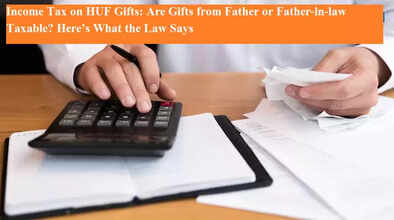Income Tax on HUF Gifts: Are Gifts from Father or Father-in-law Taxable? Here’s What the Law Says

The issue of taxation on gifts often confuses taxpayers, especially when it involves a Hindu Undivided Family (HUF). A recent case highlights this question: If a father or father-in-law gives a monetary gift to an HUF, is it taxable under the Income Tax Act? Tax experts explain the rules clearly.
Gift Tax Rules Under Section 56(2)(X)
According to Section 56(2)(X) of the Income Tax Act, gifts are taxable in the hands of the recipient under specific conditions. If a person receives gifts (either cash or in kind) worth up to ₹50,000 in a financial year, no tax is applicable. However, if the total value of gifts exceeds this threshold, the entire amount is treated as income and taxed as per the applicable slab rate of the recipient.
But there are important exemptions for relatives. Gifts received from certain specified relatives are completely tax-free, regardless of the amount. This provision is designed to prevent unnecessary taxation on genuine family transactions.
How Does This Apply to HUFs?
A Hindu Undivided Family is a distinct tax entity, separate from its individual members. Its members include all lineal descendants of a common ancestor, their spouses, and children. In an HUF, the senior-most male member is typically the “Karta,” who manages the family’s affairs.
Tax expert Balwant Jain explains that when an HUF receives a gift from its members, it is not taxable, irrespective of the value. However, in such cases, the concept of clubbing of income comes into play. This means any income generated from the gifted asset may be taxable in the hands of the person who originally gave the gift.
Gifts from Father or Father-in-law: Taxable or Not?
Here lies the crucial point. While members of an HUF are considered “relatives,” a father or father-in-law of an individual member does not qualify as a direct member of that HUF. They are not lineal descendants of the common ancestor. Hence, their gifts fall outside the exemption list.
For instance, in the case of Manoj Saha, who recently formed an HUF with his father as Karta, his father gifted the HUF ₹5 lakh. Similarly, his father-in-law contributed as well. Since neither the father nor the father-in-law qualifies as a member of the HUF, these gifts will be treated as taxable income in the year they are received.
Penalties for Non-Disclosure
Taxpayers should also be aware of the consequences of non-disclosure. If such gifts are not reported in the Income Tax Return (ITR), the penalty can be as high as 200% of the unpaid tax, in addition to the regular tax liability and interest. This makes it crucial for HUFs to correctly declare gifts in their annual filings.
Best Tax Filing Option for HUFs
Experts suggest that filing under the new tax regime is often more beneficial for HUFs, as the overall tax outgo tends to be lower compared to the old regime. Careful tax planning can help reduce the liability while staying compliant with the law.
Key Takeaways for Taxpayers
-
Gifts up to ₹50,000 per financial year are tax-free.
-
Gifts from specified relatives are fully exempt, regardless of value.
-
HUF members qualify as relatives, but father and father-in-law do not.
-
Gifts from father or father-in-law to an HUF are taxable as income.
-
Non-disclosure may attract heavy penalties, including up to 200% fine.
In short, while gifting within families is common, taxpayers must carefully understand the definitions of relatives under income tax law to avoid unexpected tax liabilities. Consulting a tax advisor before making or receiving significant gifts can save both money and legal trouble.

